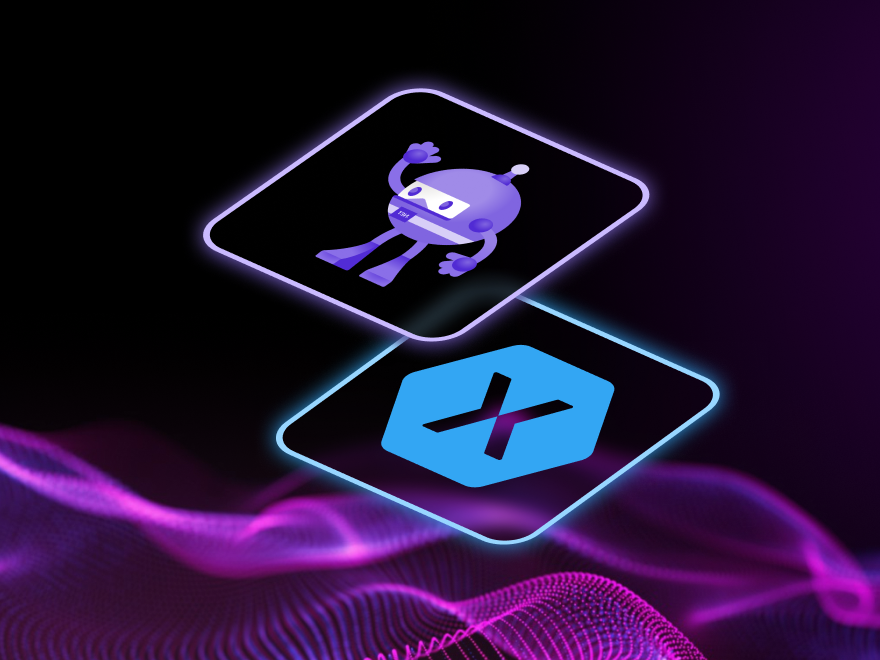Your message has been sent.
We’ll process your request and contact you back as soon as possible.
The form has been successfully submitted.
Please find further information in your mailbox.



Java has been a major player in enterprise software development for decades — and it’s not going anywhere. Even in 2024, it’s one of the most widely used and tested languages, ranking right up there with JavaScript, SQL, and Python. Clearly, businesses still trust Java to power their most critical applications.

But why is Java used for enterprise software development so frequently? In this article, I’ll break it all down from its biggest advantages to real-world use cases, must-know frameworks, and how it’s keeping up with modern trends. Let’s jump in!
When it comes to enterprise software, there are three things you just can’t compromise on: reliability, scalability, and security. And if there’s one language that consistently delivers on all three, it’s Java. So, why do businesses still put their trust in Java after all these years? Let’s break down the benefits of JAVA for enterprise software development.
One of Java’s biggest strengths is its “write once, run anywhere” approach. When you compile a Java application, it turns into platform-independent bytecode, which runs on any system with a JVM — whether it’s Windows, Linux, macOS, or even mainframes.
With Java’s robust ecosystem and extensive libraries, the possibilities are endless. Whether you’re a startup launching your first product or an enterprise upgrading your software infrastructure, Java’s got the tools and flexibility to make it happen. Let’s check out some of the most common things you can build with it.
If you’ve ever worked with an ERP or CRM system, there’s a good chance it was built with Java. These platforms handle everything from inventory management and logistics to sales pipelines and customer interactions, and they need to be scalable and adaptable as businesses grow.
That’s where Java shines. Its modular architecture makes it easy to expand and customize features without breaking the whole system. Frameworks like Spring also speed up enterprise software development with Java while keeping codebases clean and maintainable.
Java is a powerhouse for web and cloud-based solutions, whether it’s a small e-commerce store or a huge SaaS platform. Modern frameworks like Spring Boot, Dropwizard, and Quarkus help developers build fast, lightweight apps that can handle growing user demand.
And let’s not forget about cloud deployment. Java plays well with Docker and Kubernetes, which makes it a great choice for DevOps-driven environments where quick updates and smooth scaling are a must.
Big data is the backbone of decision-making, and Java is right at the center of it. Major big data frameworks like Apache Hadoop, Apache Spark, and Apache Kafka either run on Java or have deep Java integrations, making them a top choice for handling massive datasets, real-time analytics, and IoT-generated data.
If your business needs scalability, reliability, and high-performance processing, Java-based big data solutions keep everything running smoothly even when workloads skyrocket.
Banks, insurance companies, and fintech startups trust Java for mission-critical apps, and for good reason. It’s secure, reliable, and built for performance.
With built-in concurrency features, Java can handle millions of transactions per second, making it ideal for trading systems, payment processing, fraud detection, and risk management. Also, its strong security capabilities help businesses stay compliant with regulations like PCI DSS and GDPR.
Thanks to frameworks like Deeplearning4j, Java is a solid pick for machine learning, chatbots, and AI-powered analytics.
The big win here is smooth integration. If your infrastructure already runs on Java, adding AI features is a lot less hassle than switching tech stacks completely. That means you can roll out AI solutions faster, with fewer headaches, and keep everything under one familiar umbrella.
Blockchain isn’t just for crypto anymore. It’s powering secure supply chains, financial ledgers, and identity management systems. Java’s threading model, networking capabilities, and cryptographic libraries make it a strong pick for blockchain development.
The key reason companies stick with Java for blockchain is familiarity. If they’re already using Java for backend systems, it’s easier (and wallet-friendly) to build blockchain solutions without switching tech stacks.
“Java’s got the reliability we need to build enterprise solutions that don’t buckle under shifting demands. Its huge ecosystem of tools and libraries means you can focus on real business challenges rather than wrestling with infrastructure. And with a massive, engaged community always making it better, Java is still front and center in our development process.”

Choosing the right tools is a big deal when it comes to Java enterprise application development. In 2024, Spring framework was the top pick for nearly 10% of developers, followed by Spring Boot and Exceptions. But that doesn’t mean they’re automatically the best fit for you. Let’s take a quick look at some top options to give you a feel for what’s out there.

If you’re dealing with databases, Hibernate has your back. It’s the go-to ORM tool that makes mapping Java objects to database tables a breeze. Forget spending hours writing SQL queries — Hibernate handles it for you, saving time and keeping your code clean, modular, and easy to test.
JSF is a tried-and-true Java framework for building server-side UIs, and it’s still in use today. It provides a solid set of pre-built UI components and works seamlessly with Java EE. While it might feel a bit stiff compared to newer frameworks, its standardization, and Oracle’s backing make it a reliable option for businesses that need stability and long-term support.
| Framework | Key benefits | Use cases |
| Spring | Comprehensive ecosystem, dependency injection | Web applications, microservices |
| Struts | MVC framework, easy to maintain | Legacy enterprise apps, structured MVC |
| Hibernate | Object-relational mapping (ORM) | Database interactions, domain models |
| Apache Wicket | Component-based approach | Stateful web applications |
| JSF | Java EE standard for building UIs | Enterprise UI development |
| Dropwizard | Quick REST API development, minimal setup | Microservices, small REST endpoints |
| GWT | Transpiles Java to JavaScript, robust tooling | Rich client-side web apps |
| Quarkus | Native images, fast startup times | Cloud-native, containerized microservices |
| Play | Reactive model, focus on high performance | Real-time applications, streaming data |
Over the years, I’ve worked on Java projects across multiple industries, and if there’s one thing I can say with confidence — it’s everywhere. Whether it’s finance, healthcare, or e-commerce, Java remains a powerhouse for enterprise development. It’s flexible, scalable, and battle-tested, which is why so many businesses still rely on it. Let’s take a look at some of the key areas where it plays a major role.
Big companies rely on Java to keep their ERP systems running, managing supply chains, workforce planning, and daily operations. In manufacturing, Java-powered IoT solutions track production in real time, predict maintenance needs, and automate workflows to keep everything moving efficiently.
Take Volkswagen, for example. They teamed up with AWS to build the Volkswagen Industrial Cloud, linking 120+ factories worldwide. Java helps connect data across plants, making manufacturing smarter, more efficient, and ready for the future.
Money never stops moving, and Java keeps banking systems running 24/7. From online banking and trading platforms to digital wallets, Java helps process millions of transactions securely while plugging into AI and cloud solutions for fraud detection and risk management.
Just look at Citibank. Their core banking runs on Java, and they’re constantly hiring Java developers to keep everything fast, reliable, and secure.
In e-commerce, speed and reliability are everything. Java runs online stores, payment systems, and customer analytics, making sure retailers can handle massive traffic spikes, especially on Black Friday and Cyber Monday, without breaking a sweat.
Amazon is one of the biggest Java success stories. They use Java to manage their giant product catalog, process millions of transactions daily, and keep everything running smoothly, no matter how crazy the traffic gets.
In healthcare, there’s no room for downtime. Systems need to be secure, reliable, and always on. Java powers EHR platforms, patient management systems, and remote monitoring tools, ensuring hospitals and clinics stay up and running around the clock.
Cerner, a top EHR provider, has relied on Java for years in its backend services. The company built core platform components and microservices in Java, including a shift from traditional app servers to containerized Java services on Kubernetes. This move boosted the scalability and resilience of its Millennium EHR and other healthcare platforms.
Java is a solid choice for enterprise apps. But let’s be real, it comes with its fair share of challenges. In this section, I’ll walk you through some of the common roadblocks you might run into and share practical ways to tackle them head-on.
One of the biggest complaints I hear — Java’s too slow. And yeah, garbage collection and the JVM can sometimes add lag, but most of the time, it’s totally fixable with the right setup.
For most enterprise apps, it’s not a big deal. But if you’re running real-time systems like high-frequency trading or banking platforms, even a slight delay is a problem. Optimized GC algorithms like G1 and ZGC can cut down on those annoying pauses. Also, tweaking JVM settings and using tools like VisualVM and YourKit can significantly improve performance.
Java enterprise app development is like putting together a massive LEGO set without the instructions. You’ve got frameworks, APIs, databases, and cloud services all trying to work together. Skip the structure, and things spiral out of control fast.
What works? Automation and smart tooling. Tools like Maven and Gradle help manage dependencies so you’re not constantly battling conflicts. And if you’re not using CI/CD pipelines yet, start now. It’ll save you from debugging disasters later. Trust me, setting up a structured dev environment from the start makes everything easier and way less frustrating.
Java’s massive ecosystem is a double-edged sword. On the one hand, you’ve got a library for pretty much everything. On the other hand, you’ve also got version conflicts, where one part of your app needs Library X v1.2, but another part insists on v2.0. And suddenly, your build is breaking left and right.
The way out is to stay ahead of the chaos. Tools like Maven’s Dependency Tree and Gradle’s Dependency Insight help spot conflicts before they wreck your build. Many companies also use a golden image — a curated list of approved, stable libraries that keep everything consistent. It might feel like extra work upfront, but it’ll save you from banging your head against the wall in endless debugging sessions.
Let’s be real, figuring out the cost of enterprise software development in Java isn’t as simple as putting a price tag on it. There are a lot of moving parts: project scope, team size, complexity, and even things like regulatory compliance or third-party integrations. Whether you’re building a lightweight internal tool or a full-scale enterprise system, here’s a rough breakdown of what you might expect budget-wise.
Java is hitting 30 in 2025. And most languages don’t get to celebrate that kind of milestone and still stay relevant. But here we are, with about 30% of developers counting on Java for everything from enterprise apps to Android and cloud solutions. That adaptability is why it’s still a top pick for large-scale business projects. So, where’s Java enterprise software headed next? Let me break it down for you.
At Innowise, we’ve built a strong track record in Java development, helping businesses modernize, scale, and optimize their software. Whether it’s upgrading legacy systems or building enterprise applications from the ground up, we make sure every Java solution delivers a real, measurable impact. Here’s a look at some of our standout projects.
A client came to us with a logistics platform stuck on Java 6, outdated, expensive to maintain, and full of security risks. They didn’t just need an upgrade; they needed a complete transformation to keep pace with their growing business.
We rebuilt the system from the ground up, migrating it to Java 17 and adopting a microservices architecture. The improvements were clear right away: order processing sped up, security became airtight, and the system now supports over 500 concurrent users without a hitch.
Coordinating materials, equipment, and workers across multiple construction sites can get chaotic fast. One of our clients was dealing with scattered operations, unreliable asset tracking, and workforce coordination headaches. They needed a centralized system to bring everything under control and keep projects running smoothly.
We built a solution that tracks materials from warehouse storage to on-site usage, giving teams real-time visibility and reducing waste. Workforce assignments became more efficient, with instant updates on job statuses and equipment locations. An interactive map made project planning easier, while automated reports, contracts, and invoices cut down on admin delays. For security, we implemented role-based access control and ID card authentication to keep sensitive data safe.
Now, instead of struggling with inefficiencies, the client has a structured, reliable system that keeps everything in sync, ensuring projects stay on schedule and resources are used effectively.
When a major European energy provider found their gas management system slowing down critical operations, they knew it was time for a change. Inefficiencies in supply control, dispatching, and forecasting were causing costly inaccuracies and operational slowdowns. They needed a system that could handle real-time data, automate key processes, and scale with growing demand.
We built a web-based gas management platform paired with a mobile app, integrating critical subsystems to streamline operations. Gas accounting became more precise, user management more flexible, and emergency dispatching more responsive. Automated maintenance tracking, real-time analytics, and a powerful reporting portal brought the entire system up to modern standards.
The results spoke for themselves. Operational efficiency shot up by 60%, while expenses dropped by 25%. With a scalable, high-performance platform, the client now has full visibility and control over gas distribution, ensuring greater accuracy, security, and long-term sustainability.
Java is still one of the top choices when it comes to enterprise software because it’s designed to tackle complex, large-scale projects without missing a beat. Sure, you’ll run into some bumps, but with expert Java development services on your side, those don’t have to become full-on roadblocks.
If you’re aiming to build a future-proof solution that scales with your business, keeps your data safe, and integrates seamlessly with other systems, Java is a safe bet. Pair that with the right partner, and you’ve got a recipe for a solid, high-impact project that sets you up for success for years to come.

Dmitry leads the tech strategy behind custom solutions that actually work for clients — now and as they grow. He bridges big-picture vision with hands-on execution, making sure every build is smart, scalable, and aligned with the business.
Why Innowise?
IT professionals
93%
recurring customers
years of expertise
successful projects












Your message has been sent.
We’ll process your request and contact you back as soon as possible.

By signing up you agree to our Privacy Policy, including the use of cookies and transfer of your personal information.